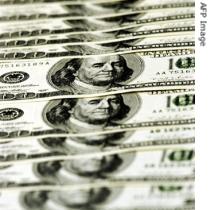2007年VOA标准英语-US Dollar Seen as Weak, Declining Further
搜索关注在线英语听力室公众号:tingroom,领取免费英语资料大礼包。
(单词翻译)
By Barry WoodWashington
18 July 2007
The House of Representatives Financial Services Committee Tuesday heard from economists1 who agreed the weakening dollar is likely to decline further. VOA's Barry Wood reports.
 |
"It's lost more than 10 percent against the British pound," he said. "And lo and behold3, the Indian rupee - if you had been holding Indian rupees - you would have made 13 percent."
Paul asked the panel of three economists whether Americans should be worried by the dollar's decline. Alan Meltzer, a professor at Carnegie Mellon University in Pittsburgh, said the dollar is weak because for America's rising external deficit4.
"The long-term problem is a serious one," he said. "If you ask, over the long-term what is likely to happen to the dollar, you'd have to believe that over the long-term the dollar is going to decline in value. Why is that? Basically, because we invest more [as a nation] than we save. We save too little."
Benjamin Friedman from Harvard said no other country could get away with having such large current account (trade) deficits5. It is, he said, irresponsible for the United States to incur6 an external deficit equal to 6.5 percent of its national income.
But none of the economists saw a danger in the huge accumulation of dollars by China and Japan. Neither country, they said, would gain by selling their dollar holdings in order to devaluate the currency further.
Jamie Galbraith, the son of the late Nobel-winning economist2 John Kenneth Galbraith, is a professor at the University of Texas.
"The problem, as I see it, is that the system - like all monetary7 systems - is inherently precarious," he said. "It is subject to a shock, a crisis, a panic, a collapse8 down the road."
None of the economists would predict how much further the dollar will drop. But they said a further decline could help by lowering the prices of U.S. exports, thereby9 boosting exports and reducing the size of the external deficit.
 收听单词发音
收听单词发音 




